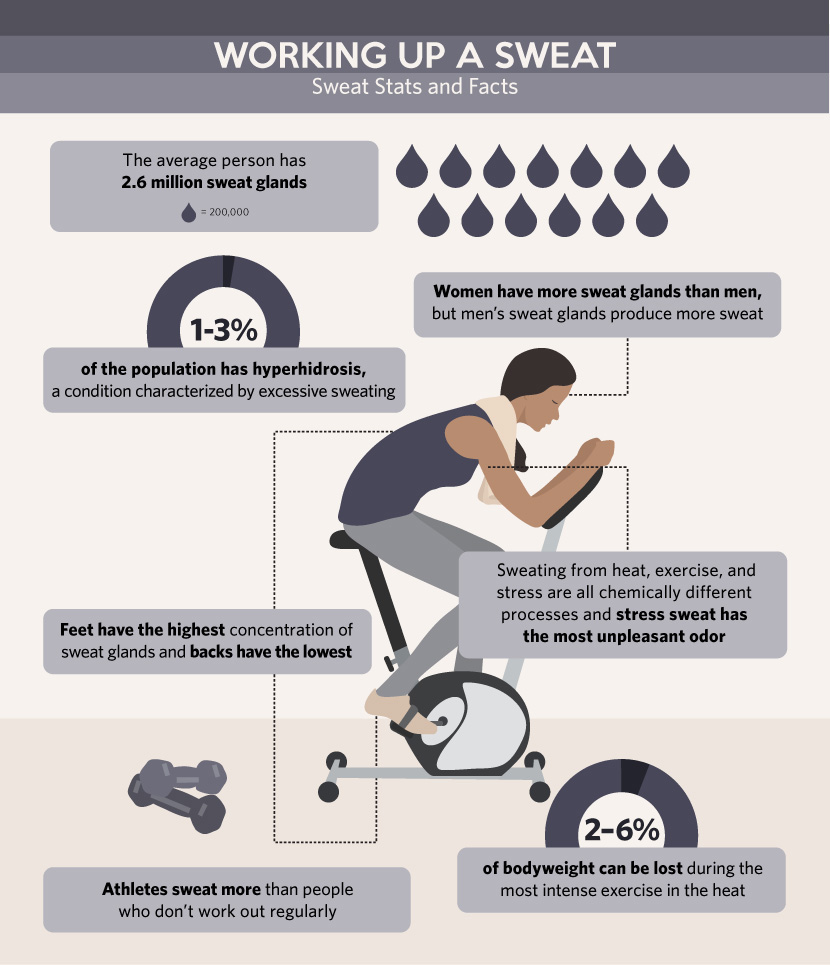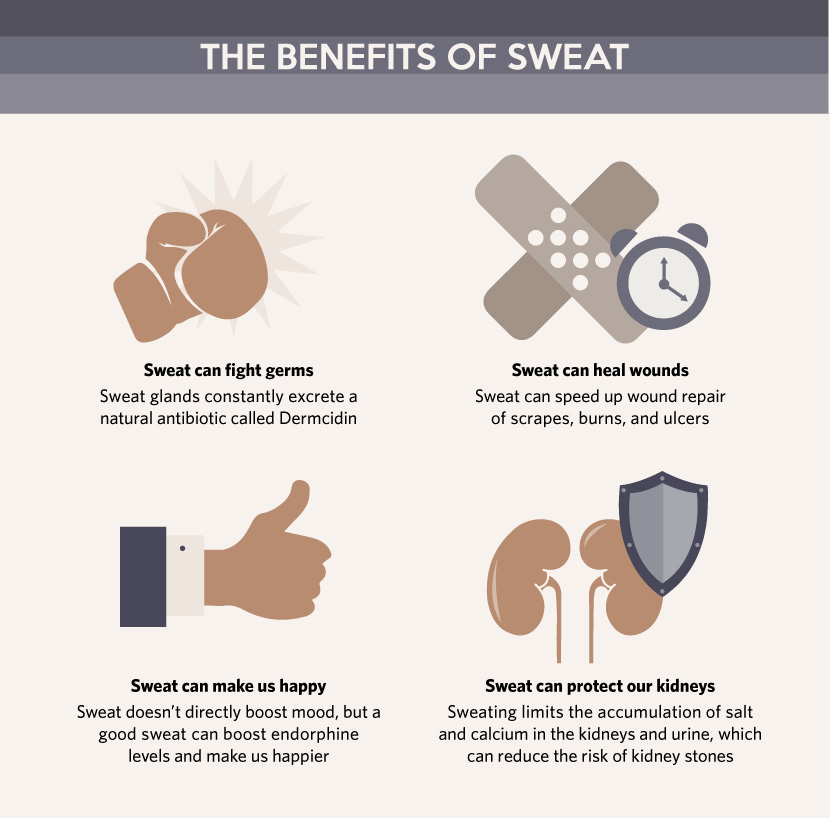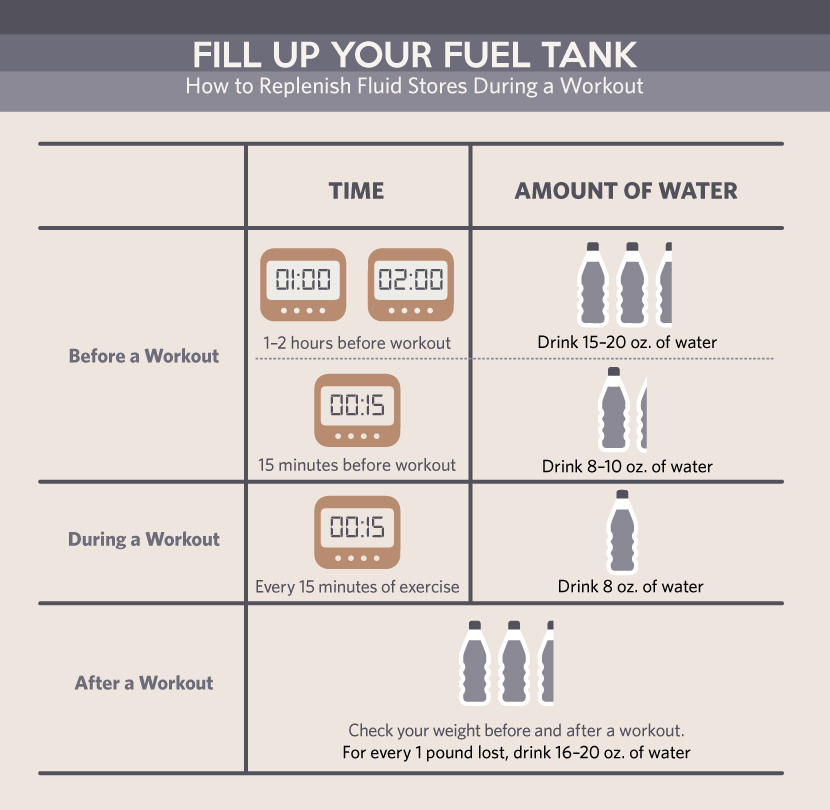You might work up a sweat at various times: a long run, sunny summer afternoon, or an important job interview, to name a few. Whether it’s refreshing or unplanned, sweating leads to a number of incredible health benefits, some of which may be surprising.
Perspire Much? Don’t Sweat It!
Glance around any fitness class, and you’ll see all kinds of perspiration. Some exercisers will be drenched from head to toe, while others will have nary a drop of sweat on the brow. Sweat isn’t exactly one of the great mysteries of the universe, but there is still a lot to discover about this amazing built-in skin system.
The human body is equipped with its own cooling system. The skin is covered with approximately two to five million sweat glands that run like ductwork in an attic. How much a person sweats is determined by physiological characteristics, including age and gender, room temperature, the level of exertion during exercise, how anxious a person feels, and whether the person is overweight.1
On average, humans can produce up to one to three liters of sweat per hour. Exercise and heat are the most common causes of perspiration because sweat’s main job is to cool down the body. However, stress, anxiety, and excitement can also cause sweating.2 That’s why foods and beverages that increase anxiety, such as coffee and tea, can ramp up sweat production.
Let’s take a look at the chemical makeup of sweat and learn why we all perspire in the first place.
The Reasons Behind Salty and Stinky Sweat
Sweat is primarily made up of water but it also contains salt and, depending on a person’s diet, other chemicals. Ever heard of the saying, “You are what you eat?” That’s not too far from the truth for sweat. The chemical composition of sweat can be altered by food and drinks, the reason for sweating, and how long a bout of sweating lasts.
One of the highest mineral concentrations in sweat is sodium, which explains why sweat tastes salty. In addition, sweat contains moderate amounts of potassium, chloride, calcium, and magnesium as well as small amounts of trace minerals including copper, zinc, and iron.3
But not all sweat is created equally. The human body hosts two different types of sweat glands: eccrine and apocrine. Eccrine sweat glands work like ducts on the skin’s surface and produce a watery substance. These glands are mostly concentrated on the brow, hands, and feet (though they cover much of the body), and they function primarily as the body’s A/C unit.4
Apocrine sweat glands are found in the hair follicles located in and around the scalp, armpits, anus, and genitals. Apocrine sweat glands produce a thicker, plasma-like substance that also contains fatty acids and protein byproducts, including urea and ammonia. Emotional stress triggers apocrine glands to expel fatty sweat into the skin, where bacteria break it down. This turns into an odorous fatty acid substance, which makes certain types of sweat smell and causes unsightly underarm stains . These glands remain inactive until puberty, which explains why preteen children suddenly smell after recess.
Man vs. Woman: The Sweatonomics
Japanese scientists discovered that women need to exercise harder than men to get a good sweat going. The researchers placed four subject groups in a controlled environment and then asked them to cycle continuously for one hour. The study showed that men are more efficient at sweating and that untrained women had the worst response when it came to breaking a sweat.5
Previous studies have shown that higher levels of testosterone in men may increase sweat output. The study mentioned above was the first to suggest that women may be at a disadvantage when it comes to cooling off during heavy bouts of exercise or during hot conditions. Researchers have suggested an evolutionary reason for this: women carry less body fluid than men, and they may sweat less to prevent dehydration. For this reason, it may be advisable for women to take more precautions in extreme heat conditions or during long bouts of exercise.
Age-related factors can also affect the amount of sweat a person produces. As the skin changes during the aging process, the sweat glands produce less sweat. This can make it harder to cool off and may increase the risk of heat stroke.6
Sweat Glands: The Everyday Hero
Sweat glands aren’t just nature’s ice bath. From warding off bacteria to protecting the kidneys, perspiration is the inspiration for several healthy functions that extend beyond a good cool down.
Germ Fighters
While studying proteins involved in skin cancer, a team of researchers discovered a potent natural antibiotic called dermcidin. The researchers learned that sweat glands constantly excrete this antibiotic.7 Persistent skin washing can remove this natural protective barrier.
Though a long shower after a hot sweaty day sounds perfect, it may limit your defense against germs. University of California researcher Tomas Ganz notes that bacteria thrive in hot, moist conditions. Dermcidin can limit what thrives on our skin, reducing our risk of infection. But Ganz cautions that being sweaty all the time does not guarantee protection: “It depends on how much dermcidin a person exudes.”8
Healing Powers
University of Michigan researchers discovered that sweat glands play a role in the wound-healing process, including recovery from scrapes, burns, and ulcers. In a study published in the American Journal of Pathology, Laure Rittié, Research Assistant Professor of Dermatology, notes that sweat glands are understudied and that they may hold the secret to speeding up wound repair.9
The study found that eccrine glands store an important reservoir of adult stem cells that can quickly take action when a wound occurs. Rittié explains that sweat glands are understudied because they are unique to humans and not present in animals, which are commonly studied in laboratories. Rittié and her research team hope these findings will pave the way for a greater understanding of the skin’s healing process and lead to better targeted therapies – especially for those who experience skin ulcers from diabetes or bedsores.
Happiness Defenders
The act of sweating alone doesn’t ward off bad moods, but a good sweat in the gym or outdoors increases endorphin levels – those feel-good hormones that contribute to a runner’s high.10 Endorphins are related to positive mood and an enhanced sense of overall well-being. Endorphins are related to positive mood and an enhanced sense of overall well-being.11
Kidney Protectors
Sweating limits the accumulation of salt and calcium in the kidneys and urine, which can reduce the risk of kidney stones. In addition, more sweating increases thirst, which may lead to greater water consumption. The more water goes in, the less likely it is that kidney stones will form.
A study published in 2013 by the American Society of Nephrology found that small amounts of physical activity and reduced caloric consumption might decrease the risk of kidney stone development by 31 percent.12 Breaking a little sweat on a brisk daily walk can go a long way when it comes to prevention.
How Much Sweat is Too Much?
For the most part, sweating is necessary and healthy. But sweating more than normal may be caused by a condition called hyperhidrosis. Hyperhidrosis occurs when the body sweats unnecessarily, dripping perspiration from the head, feet, palms, or underarms.13 Though it’s not harmful, excessive sweating can put a damper on daily activities and cause added stress, which can lead to even more sweating.
Signs of Hyperhidrosis:
- Visible sweat when no physical exertion or excessive heat is present
- Interfering with daily activities (for example, sweaty palms make it difficult to open doors)
- Soft, peeling skin from continued moisture
- Frequent skin infections, such as athlete’s foot or jock itch
Tips to Reduce Excessive Sweating:
- Apply antiperspirant (not deodorant) to dry underarms before bed. Sweating is less likely to occur during sleep, and this will allow the skin to absorb more of the ingredients overnight, which provides greater protection during the day.
- Avoid foods and beverages that may cause excess sweating or anxiety. Some of these foods are caffeinated beverages, such as coffee and tea, and spicy foods.
- Wear natural fibers that allow the skin to cool. Loose clothing can also help prevent excessive sweating.
- Learn how to relax during stressful situations. Meditative practices can reduce stress and anxiety, which may help reduce perspiration.
- When all else fails, a dermatologist can prescribe an antiperspirant or inject Botox in the affected areas, which can reduce excessive sweating.
Go Ahead, Break a Sweat
Offering a natural cooling system and unique healing properties, a little perspiration each day may be what keeps the doctor at bay. Remember to replenish what you sweat out by sipping plenty of water throughout the day and drinking a little more during and after a vigorous workout.



No comments:
Post a Comment